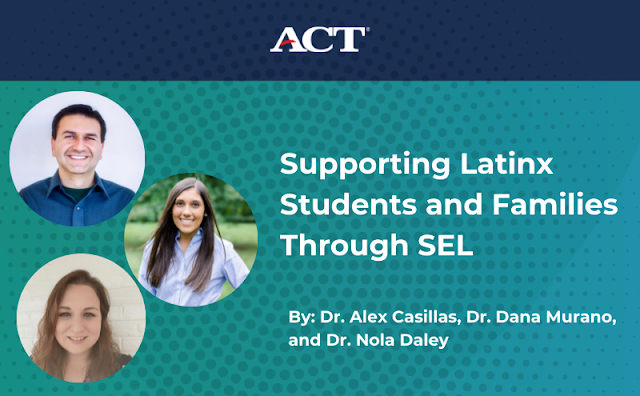By Dr. Alex
Casillas, principal research scientist; Dr. Dana Murano, research scientist II; and Dr. Nola Daley, research scientist, ACT Social, Emotional, and Academic Learning research team
This year marks the second HHM that finds us amidst the COVID-19 pandemic, which has laid bare a variety of inequities and has disproportionately impacted students of color, students from low-income households, and those students who will be the first among their family to attend college. For example, toward the beginning of the pandemic, ACT surveys found that Hispanic/Latinx high school students reported a higher rate of challenges learning in remote settings, experienced a higher degree of food insecurity, and were worried about their family’s finances at higher rates than many of their peers.
Indeed, over the course of the past 18 months we have witnessed a variety of examples showing we do not all start from the same place and we do not all have access to the same opportunities. However, from this exacerbated “state of inequity,” organizations and communities have stepped up to create better opportunities for their students.
An example of such an organization is Region One Educational Service Center in South Texas. Located along the U.S.-Mexico border between Laredo and the Gulf of Mexico, Region One serves more than 430,000 K-12 students. The majority of these students are Hispanic/Latinx, come from low-income communities, are among the first in their families who might be able to attend a postsecondary institution, and many of them are English learners (ELs). ACT and Region One have collaborated on a variety of projects over the last decade. This collaboration has yielded many learnings and provided opportunities to increase the success of the students in Region One. Here we summarize a few of our latest findings based on work that we accomplished during the pandemic.
Throughout the pandemic, we engaged in a research study with Region One to understand the effects on social and emotional learning (SEL) implementation. Specifically, the work targeted students, teachers, and families within the region. Although the pandemic created many hurdles, the persistence, cooperation, and resilience of the Region One community allowed us to continue this study and even expand the scope of this work to account for additional factors affecting lesson implementation. From this work we outline some following lessons learned about administrators, educators, families, and students. The work resulted in a series of research briefs, all of which can be found along with an executive summary, here.
- Educators and administrators saw value in SEL and believed in its efficacy for improving student outcomes (Brief 1). However, their responses indicated potential roadblocks to SEL implementation, such as a lack of perceived control over implementation and lower buy-in from external stakeholders. From educators that participated in a webinar series focusing on schoolwide SEL implementation, we learned that most schools are in the early stages of schoolwide SEL implementation (Brief 4). These results suggest educators need additional resources to support their implementation of structured SEL programming.
- Family members believed that developing social and emotional skills is important for their students and for themselves and saw themselves playing an important role in the development of their student’s skills (Brief 5). Overall, terms related to SEL were generally familiar to family members. These results highlight the importance of including programming for families in systematic approaches to SEL. As one parent said,“Ojalá pudieran seguir organizando estos talleres , nos ayudan muchísimo a los padres para aprender sobre técnicas que nos presentan los coaches y de experiencias de otros padres de familia para lograr un mejor entendimiento sobre tópicos que nos interesan y utilizarlo para desarrollar un crecimiento personal que beneficia a nuestra familia.” (“I wish you could continue organizing these workshops, they help us parents a lot to learn about techniques that coaches present us and from experiences of other parents to achieve a better understanding about topics that interest us and use it to develop personal growth that benefits our family.”)
- Students who completed the SEL lessons reacted positively, perceived learning gains, and felt confident applying content from these lessons (Brief 2). Relationships between these lessons and the more long-term outcomes examined were mixed, but hours spent on the SEL lessons helped predict improved math grades and decreased odds of a disciplinary incident in 2020 (Brief 3). These promising results emerged despite the low dosage of SEL lessons students received. These findings underscore the importance of sustained implementation of SEL programming.
So, as we celebrate Hispanic History Month, we have three words of encouragement for our friends and colleagues in Hispanic/Latinx communities throughout the U.S.: Juntos, sí podemos! (Together we can!) ACT is—and will continue to be—a thought partner and collaborator in bringing solutions that can help students and communities succeed at school, at work, and in life.



